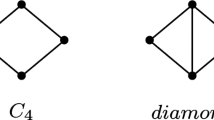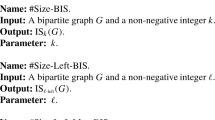Abstract
An algorithm is presented for exactly counting the number of maximum weight satisfying assignments of a 2-Cnf formula. The worst case running time of O( 1.246n) for formulas with n variables improves on the previous bound of O( 1.256n) by Dahllöf, Jonsson, and Wahlström. The algorithm uses only polynomial space. As a direct consequence we get an O(1.246n) time algorithm for counting maximum weighted independent sets in a graph.
Preview
Unable to display preview. Download preview PDF.
Similar content being viewed by others
References
Angelsmark, O.: Constructing algorithms for constraint satisfaction and related problems: Methods and applications. PhD. thesis, Linköping University (2005)
Beigel, R., Eppstein, D.: 3-coloring in time O(1.3289n). Journal of Algorithms 54(2), 168–204 (2005)
Björklund, A., Husfeldt, T.: Inclusion–exclusion algorithms for counting set partitions. In: Foundations of Computer Science, pp. 575–582. IEEE Computer Society Press, Los Alamitos (2006)
Dahllöf, V., Jonsson, P.: An algorithm for counting maximum weighted independent sets and its applications. In: Symposium on Discrete Algorithms, pp. 292–298. SIAM, Philadelphia (2002)
Dahllöf, V., Jonsson, P., Wahlström, M.: Counting satisfying assignments in 2-SAT and 3-SAT. In: H. Ibarra, O., Zhang, L. (eds.) COCOON 2002. LNCS, vol. 2387, pp. 535–543. Springer, Heidelberg (2002)
Dahllöf, V., Jonsson, P., Wahlström, M.: Counting models for 2SAT and 3SAT formulae. Theoretical Computer Science 332(1-3), 265–291 (2005)
Dantsin, E., Gavrilovich, M., Hirsch, E., Konev, B.: MAX SAT approximation beyond the limits of polynomial-time approximation. Annals of Pure and Applied Logic 113, 81–94 (2002)
Davis, M., Logemann, G., Loveland, D.: A machine program for theorem-proving. Communications of the ACM 5(7), 394–397 (1962)
Davis, M., Putnam, H.: A computing procedure for quantification theory. Journal of Association Computer Machinery 7, 201–215 (1960)
Dubois, O.: Counting the number of solutions for instances of satisfiability. Theoretical Computer Science 81(1), 49–64 (1991)
Fürer, M., Kasiviswanathan, S.P.: Algorithms for counting 2-SAT solutions and colorings with applications. TR05-033, Electronic Colloquium on Computational Complexity (2005)
Koivisto, M.: An O *(2n ) algorithm for graph coloring and other partitioning problems via inclusion–exclusion. In: Foundations of Computer Science, pp. 583–590. IEEE Computer Society Press, Los Alamitos (2006)
Kozen, D.C.: The Design and Analysis of Algorithms. Springer, Berlin (1992)
Kullmann, O.: New methods for 3-SAT decision and worst-case analysis. Theoretical Computer Science 223, 1–72 (1999)
Littman, M.L., Pitassi, T., Impagliazzo, R.: On the complexity of counting satisfying assignments. In: The Working notes of LICS 2001 Workshop on Satisfiability (2001)
Roth, D.: On the hardness of approximate reasoning. Artificial Intelligence 82(2), 273–302 (1996)
Vadhan, S.P.: The complexity of counting in sparse, regular, and planar graphs. SIAM Journal on Computing 31(2), 398–427 (2002)
Valiant, L.G.: The complexity of computing the permanent. Theoretical Computer Science 8(2), 189–201 (1979)
Valiant, L.G.: The complexity of enumeration and reliability problems. SIAM Journal of Computing 8(3), 410–421 (1979)
Zhang, W.: Number of models and satisfiability of sets of clauses. Theoretical Computer Science 155(1), 277–288 (1996)
Author information
Authors and Affiliations
Editor information
Rights and permissions
Copyright information
© 2007 Springer Berlin Heidelberg
About this paper
Cite this paper
Fürer, M., Kasiviswanathan, S.P. (2007). Algorithms for Counting 2-Sat Solutions and Colorings with Applications. In: Kao, MY., Li, XY. (eds) Algorithmic Aspects in Information and Management. AAIM 2007. Lecture Notes in Computer Science, vol 4508. Springer, Berlin, Heidelberg. https://doi.org/10.1007/978-3-540-72870-2_5
Download citation
DOI: https://doi.org/10.1007/978-3-540-72870-2_5
Publisher Name: Springer, Berlin, Heidelberg
Print ISBN: 978-3-540-72868-9
Online ISBN: 978-3-540-72870-2
eBook Packages: Computer ScienceComputer Science (R0)




